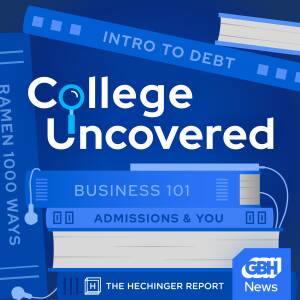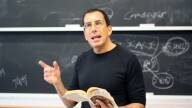Episodes
-
[BONUS] The New College Compact
Across the country, public universities are being flooded with requests for syllabi, reading lists, course materials, and data on international students. One company is behind many of those requests - Metric Media. Part of a growing network of conservative-led groups, Metric Media says it’s enforcing civil rights laws and holding taxpayer-funded institutions accountable. But critics see something very different: a coordinated pressure campaign emboldened by the second Trump administration that threatens academic freedom and seeks to intimidate scholars. Now some universities are pushing back.In this bonus episode of College Uncovered, GBH’s Kirk Carapezza talks with Brian Timpone, CEO and founder of Metric Media. In a rare interview, Timpone says there’s great public interest in what public universities are teaching students and he thinks America’s public colleges have lost sight of their mission.“Some of the names of these courses, they’re almost like The Onion,” Timpone says.Dan Kennedy, a Northeastern University journalism professor, argues that groups like Metric Media are weaponizing public records laws to pressure and silence professors. We also hear from two faculty members who’ve been targeted: Christopher Petsko, a business professor at the University of North Carolina, and Jennifer Ho, a professor of Ethnic Studies at the University of Colorado–Boulder.And as the Trump administration threatens to withhold federal research funding unless universities sign its proposed “Compact for Academic Excellence in Higher Education,” some schools have already declined.Ted Mitchell, president of the American Council on Education, tells us why he believes the compact would be disastrous for colleges and the country and why you should care.“This is nothing short of a government attempt to make institutions creatures of the state,” Mitchell said. “That’s so antithetical to what higher education is and does. Higher education is about inquiry-based research, discovery-based teaching, and to deprive institutions of the ability to do that is really tantamount to just making them propaganda engines.”The New College Compact explores the escalating battle over academic freedom, political pressure, and the future of higher education in America.Additional links: Local colleges targeted amid growing campus culture warsZombies, Garbage And Vampires? It's Not A Nightmare, It's Your College Course CatalogUn-Welcome to CollegeDEI Backlash“College Uncovered” is made possible by Lumina Foundation.----------Credits:Host and Producer: Kirk Carapezza Editors: Azita Ghahramani and Jenifer McKimExecutive Producer: Lee Hill Mixing and Sound Design: David Goodman & Gary MottTheme Song and original music: Left-RomanArtwork: Matt Welch Project Manager: Meiqian HeConsulting Producer and Head of GBH Podcasts: Devin Maverick Robins"College Uncovered" is a production of GBH News -
Science In Reverse
The government rescinded billions in federal research grants during Trump’s first few months in office — cutting fellowships, scholarships, and postdoc programs that support the next generation of scientists.A federal judge recently ordered the restoration of some National Institutes of Health grants. A battle over National Science Foundation funding is still playing out in court.So what do these cuts actually mean for higher education and scientific discovery? And if the United States gives up its global lead in innovation and research, what does that mean for the rest of us?In this episode of College Uncovered, host Kirk Carapezza and reporter Craig LeMoult visit one public university hit especially hard — and explore what’s really at stake for American science.“College Uncovered” is made possible by Lumina Foundation.----------Credits:Host and Producer: Kirk Carapezza Editor: Jenifer McKimExecutive Producer: Lee Hill Mixing and Sound Design: David Goodman & Gary MottTheme Song and original music: Left-RomanArtwork: Matt Welch Project Manager: Meiqian HeConsulting Producer and Head of GBH Podcasts: Devin Maverick Robins"College Uncovered" is a production of GBH News and The Hechinger Report. -
Why Do Colleges Rarely Revoke Tenure?
Harvard just did something it hasn’t done in decades — it fired a tenured professor.Francesca Gino built her reputation studying honesty. Then she was accused of faking data. In May, Harvard’s top governing board revoked her tenure and ousted her from the Business School.But why is stripping tenure so rare — not just at Harvard, but anywhere? How common is research fraud? And why are colleges so secretive when it happens?College Uncovered’s Kirk Carapezza and reporter Mark Herz unpack the Gino case. Then Kirk sits down with science journalist and attorney Eugenie Reich, author of Plastic Fantastic: How the Biggest Fraud in Physics Shook the Scientific World.“College Uncovered” is made possible by Lumina Foundation.----------Credits:Hosts: Kirk Carapezza & Jon MarcusEditor: Jenifer McKimExecutive Producer: Lee Hill Mixing and Sound Design: David Goodman & Gary MottTheme Song and original music: Left-RomanArtwork: Matt Welch Project Manager: Meiqian HeConsulting Producer and Head of GBH Podcasts: Devin Maverick Robins"College Uncovered" is a production of GBH News and The Hechinger Report. -
S4 Eps 8 Apprentices of the World, Unite!
Is the four-year college degree losing its grip on the American Dream? Just as American colleges reach the demographic cliff in 2026, higher education in the U.S. is facing mounting pressure from all sides. President Donald Trump has targeted several highly-selective, wealthy universities, slashing federal research funding and questioning their tax-exempt status – painting them as overpriced and out-of-touch bastions of liberalism. But skepticism about college isn’t just coming from the right. On the campaign trail, Democratic nominee Kamala Harris called out the country’s narrow focus on four-year degrees, urging more support for apprenticeships and technical programs. And the public seems to agree. A growing number of Americans – nearly a third – now say they have little or no confidence in college. That’s up 10 percent from a decade ago. Employers and states desperate for talent are dropping degree requirements for certain entry-level positions. So where does that leave students and families? And how are colleges, especially those struggling to fill seats, adapting? In this episode of College Uncovered, co-hosts Kirk Carapezza and Jon Marcus dig into the rise of alternative pathways. They explain why there aren’t more apprenticeship and internship opportunities and explore what happens when the college degree is no longer the default. Whether you’re a student, parent, or just interested in the future of higher education, this episode helps explain what comes next. -
S4 Eps 7 Cyber School
Here’s a milestone you might not have heard about: It’s projected that this year, for the first time, more college students will take all of their courses online than will take all of their courses in person.Online higher education has come a long way since its predecessor, the correspondence school. The universal shift to remote learning during the pandemic only accelerated that momentum. It has also allowed more comprehensive research into whether online teaching works as well as the in-person kind.But even as more students go online to learn, there are many caveats about this fast-growing innovation. We talk to the experts about who should take online courses, where they should take them and in what subjects. We also lay out questions to ask of online providers, such as what kinds of real-world supports — faculty office hours, tutors — are available.Finally we solve a mystery that frustrates countless consumers: how in the world it’s possible that most online courses cost as much as, or more than, the brick-and-mortar kind. After all, technology has lowered prices in almost every industry. Come with us as we expose the reason higher education can find a way to charge more for yet another product that by all rights should cost less. -
S4 Eps 6 The Old College Try
The single fastest-growing group of students in college? This may come as a surprise — they’re still in high school.So-called “dual enrollment” — also known as “early college” and “concurrent enrollment” — seems a win-win. Institutions get students, at a time when demographic shifts are making that more difficult; that’s especially true at community colleges, whose enrollment has declined the most. Meanwhile, high school students rack up credits, potentially saving time and money. Some finish their associate degrees at the same time that they get their diplomas. And studies show that they’re more likely to go on to and graduate from college than their classmates who don’t.The Department of Education didn’t even track how many students were taking dual-enrollment courses until last year. It turned out that two and a half million of them are. Studies show they’re more likely to go to and graduate from college than their classmates who don’t.High school students now make up a fifth of community college enrollment. At 37 community colleges nationwide, more than half of students are still in high school.But like much in higher education, there are traps and pitfalls. Not all of those credits transfer, for example. In this episode, we provide a road map to navigating dual enrollment. -
S4 Eps 5 The Student Trade Wars
U.S. colleges have long relied on international students – and the big tuition checks they bring – to hit enrollment goals and keep the lights on. But now, just as the number of American college-aged students starts to fall – a trend known as the “demographic cliff”– global tensions are making international students think twice about coming to the U.S. for college.In this episode, hosts Kirk Carapezza and Jon Marcus take you inside the world of international admissions. With student visa revocations on the rise – often without explanation – and a growing number of detentions tied to student activism, some international families say they are rethinking their U.S. college plans. And that has college leaders sounding the alarm.As the Trump administration ramps up immigration crackdowns on campuses across the country, many worry the U.S. could lose its status as the top destination for global talent. So what happens if international enrollment drops just as domestic numbers dry up?The stakes are high – not just for students and colleges but for the entire U.S. economy. -
S4 Eps 4 The Revenge of the Humanities
American higher education is approaching a sharp drop in college-aged students — a trend known as the demographic cliff. At the same time, following decades of declining enrollment, humanities programs are being forced to adapt or risk disappearing altogether.In this episode of College Uncovered, hosts Kirk Carapezza and Jon Marcus explore how some colleges are rebranding liberal arts as “applied humanities” or “leadership studies” to better connect with career paths and market demand. With humanities majors down significantly over the past two decades, schools are searching for new ways to make these degrees more relevant — and more appealing.We travel to Georgia Institute of Technology in Atlanta, where enrollment in the College of Liberal Arts has jumped 80 percent over the past five years, thanks to a fresh focus on technology, leadership and career readiness. We hear from Richard Utz, interim dean at Georgia Tech, and Joy Connolly, president of the American Council of Learned Societies, who argue that humanities graduates bring some of the most in-demand skills to the workforce: communication, critical thinking, collaboration and the ability to navigate ambiguity.Listen to learn how the liberal arts are evolving — and why their survival may be essential to the future of higher education and the workforce. -
S4 Eps 3 The Missing Men
Something has been happening on college campuses that’s as surprising as it is dramatic: The number of women enrolled has overtaken the number of men.Women now outnumber men by about 60 percent to 40 percent, and that gap keeps getting wider. And men who do enroll are also more likely to drop out.There are a lot of reasons for this. Boys get lower grades than girls, on average, in elementary and middle schools. They’re more likely to be held back or face disciplinary actions. They’re less likely to graduate from high school. And more men than women go into the skilled trades, instead of getting college degrees.Among the results: Universities and colleges now tip the scales for men in admission to try to keep the genders even.But as things keep falling out of balance, there are impacts on the financial success for men and on economic growth for everybody.We’ll hear from men and women students about what that’s like right now, and from colleges about what they’re trying to do about it. -
S4 Eps 2 “Tag, You’re In!” – The Rise of Direct Admissions
The anxiety-inducing college admissions game is changing – what if colleges started applying to you instead of the other way around? With declining birth rates and growing skepticism about the value of a degree, higher education is facing an enrollment cliff, set to hit hard in 2026. That’s 18 years after the Great Recession when many American families stopped having babies. As competition for students intensifies, more states desperate for workforce talent and schools dependent on tuition dollars are turning to direct admissions – a system where students receive college acceptance offers and scholarships before they even apply.In this episode, hosts Kirk Carapezza and Jon Marcus break down how we got to this point where the college admission process requires students to spend a ton of time and money with no guarantee of success. And they ask whether direct admissions is the solution colleges and students need – or just a Band-Aid on a bigger enrollment crisis. -
S4 Eps 1 The Demographic Cliff
Most Americans would probably rather forget the Great Recession that began in 2007. But as long ago as it may seem, it triggered something that is about to become a big problem: Americans started having fewer babies, and the birth rate hasn’t recovered since. That means a looming decline in the number of 18-year-olds. Since those are the traditional customers for universities and colleges, enrollment is projected to fall dramatically and campuses to close. In this episode, we tell you the surprising benefits of this for students and their parents — and the scary prospects for the economy, which will suffer shortages of workers just as baby boomers retire. Come with us to a college fair where recruiters line up to compete for applicants, and hear from enrollment consultants, economists, and the president of a school that has already closed. -
Introducing College Uncovered: Season 4 – The Demographic Cliff
College Uncovered Season 4 is coming! The first two episodes drop Thursday, April 17th. This season, we’re standing on the precipice of a “demographic cliff” threatening higher education. A drop in the number of 18-year-olds that are alive right now – triggered by a decline in birth rates after the 2008 Great Recession – is forcing colleges to rethink everything. Schools across the country are changing admissions, restructuring financial aid, rebranding the humanities, and finding new ways to recruit and educate young men, whose numbers are dropping even more precipitously on many campuses. We’ll uncover how these changes affect students, families, higher education, the economy, and our society at largeCollege Uncovered is hosted by Kirk Carapezza and Jon Marcus, two skilled multimedia journalists with decades of experience in covering higher education in the United States. They offer students, their families, and anyone curious about the business of college, an unvarnished look at a uniquely American system – and help you make better informed choices. New episodes of College Uncovered drop each week through May and are available wherever you listen to podcasts.








